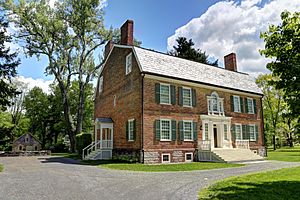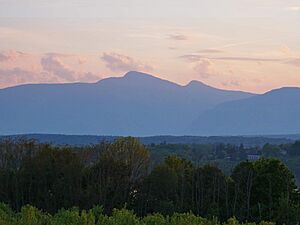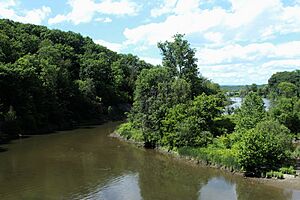Columbia County, New York facts for kids
Quick facts for kids
Columbia County
|
|||
|---|---|---|---|
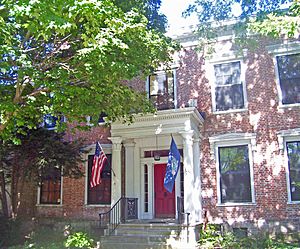
First Columbia County Courthouse in Claverack
|
|||
|
|||
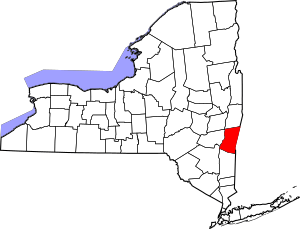
Location within the U.S. state of New York
|
|||
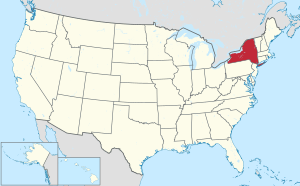 New York's location within the U.S. |
|||
| Country | |||
| State | |||
| Founded | April 4, 1786 | ||
| Named for | Christopher Columbus | ||
| Seat | Hudson | ||
| Largest city | Kinderhook | ||
| Area | |||
| • Total | 648 sq mi (1,680 km2) | ||
| • Land | 635 sq mi (1,640 km2) | ||
| • Water | 14 sq mi (40 km2) 2.1% | ||
| Population
(2020)
|
|||
| • Total | 61,570 | ||
| • Density | 97/sq mi (37/km2) | ||
| Time zone | UTC−5 (Eastern) | ||
| • Summer (DST) | UTC−4 (EDT) | ||
| Congressional district | 19th | ||
Columbia County is a county in New York State. In 2020, about 61,570 people lived there. Its main town, or county seat, is Hudson. The county's name comes from Christopher Columbus. It's part of the Capital District area of New York.
Contents
History of Columbia County
Early Inhabitants and European Arrival
Long ago, the Mahican Native Americans lived in this area. To the west, other tribes like the Mohawk lived.
In 1609, an English explorer named Henry Hudson sailed up the Hudson River. He was sailing for the Dutch. His boat had a problem, so he stopped in what is now Columbia County. He looked for food and supplies there.
In 1612, the Dutch set up trading posts. They built New Amsterdam (now New York City) and Fort Orange (now Albany). Fort Orange became a big center for trading furs with the Mohawk people. Small towns grew along the Hudson River. They helped supply the ships that traveled between New Amsterdam and Fort Orange.
Dutch and English Control
Dutch settlers bought land near Claverack in 1649 and 1667. More Dutch people arrived, and the area slowly grew. In 1664, the English took over the Dutch lands. They renamed it the "Province of New York". Fort Orange was renamed "Albany".
Livingston Manor and German Settlers
In the late 1600s, Robert Livingston bought a lot of land. He was an immigrant from Scotland. He bought 160,240 acres from the Native Americans and the government. The King made him the lord of Livingston Manor. He rented out his land to farmers.
In 1710, he sold 6,000 acres to Queen Anne of Great Britain. This land was used for work camps. German refugees came to live there. They had to work to pay for their trip to New York. About 1,200 Palatine Germans came to Livingston Manor (now Germantown). They were supposed to make things like pitch and turpentine from pine trees. These were called "naval stores".
They were promised land after they finished their work. These Germans were escaping religious wars and bad harvests. They quickly built churches. These churches kept records of births, deaths, and weddings. These were some of the first official records in the colony.
After many years, some of these settlers got land in other areas. These new communities helped protect the British settlements from the Iroquois and French.
Forming Columbia County
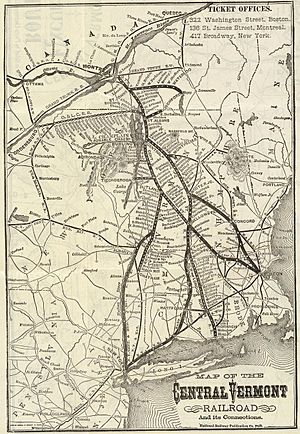
Columbia County was created in 1786. This happened after the American Revolutionary War. It was made from parts of Albany County. In 1799, the southern border of Columbia County moved south. This added more land from Livingston Manor that was in Dutchess County.
In the 1800s, the Vermont Central Railway was built. It helped people travel north to Rutland and Burlington, Vermont. It also went south to Chatham, New York, where people could connect to other trains.
In the late 1900s, many artists and writers moved to Columbia County. This included Ellsworth Kelly, James Ivory, Ismail Merchant, and John Ashbery.
Geography of Columbia County
Land and Water
Columbia County covers about 648 square miles. Most of this (635 square miles) is land. About 14 square miles (2.1%) is water.
The county is in the southeastern part of New York State. It's southeast of Albany. It is right next to the Massachusetts border. The Hudson River forms its western border.
Mountains and Views
The county has gentle, rolling hills. These hills rise sharply into the Taconic and Berkshire Mountains near the state line. To the west, you can see the Hudson River and the Catskill Mountains.
The highest point in the county is about 2,110 feet (643 meters) above sea level. It's near Alander Mountain, on the Massachusetts state line. The lowest point is near sea level, along the Hudson River.
Roads and Travel
Columbia County has two main highways. The Taconic State Parkway runs through the middle of the county. It connects the county to places south. Trucks are not allowed on this parkway. Interstate 90 also goes through the towns of Canaan and Chatham. This part is called the Berkshire Connector. I-90 has two exits in the county.
Other important roads cross Columbia County. These include U.S. Route 9, NYS Route 23, NYS Route 22, and U.S. Route 20. Depending on where you are, New York City is about 96 to 145 miles away.
Rivers, Streams, and Lakes
The Hudson River is the western border of the county. Other important creeks include:
- Ancram Creek
- Claverack Creek
- Copake Creek
- Kinderhook Creek
- Roeliff-Jansen Kill
- Valatie Kill
You can find Rossman Falls and Stuyvesant Falls on the Kinderhook Creek. Some notable lakes and ponds are:
- Copake Lake
- Kinderhook Reservoir
- Queechy Lake
- Lake Taghkanic
Farms in Columbia County

Columbia County has many local farms. They provide fresh meat, eggs, herbs, and produce. Some well-known farms are:
- Holmquest
- Ronnybrook
- Fix Brothers Fruit Farm
- Eger Brothers
- Hover Farms
- Marsh Meadow Farm
- Schober Farm
- Millerhurst
- Ooms Farm
- Churchtown Dairy
- Pigasso
- Common Hands Farm
- Darlin' Doe
- Blue Star Farm
- Green Mead Farm
- Little Ghent Farm
- Ironwood Farm
There's also Hawthorne Valley Farm, which has a farm store and training programs. Roxbury Farm uses special farming methods. FarmOn! at Empire Farm is also a teaching farm.
Neighboring Counties
Columbia County shares borders with these counties:
- Albany County - northwest
- Berkshire County, Massachusetts - east
- Dutchess County - south
- Greene County - west
- Rensselaer County - north
- Ulster County - southwest
Protected Areas
The Martin Van Buren National Historic Site is located here. It's a special place protected by the government.
Population of Columbia County
| Historical population | |||
|---|---|---|---|
| Census | Pop. | %± | |
| 1790 | 27,496 | — | |
| 1800 | 35,322 | 28.5% | |
| 1810 | 32,390 | −8.3% | |
| 1820 | 38,330 | 18.3% | |
| 1830 | 39,907 | 4.1% | |
| 1840 | 43,252 | 8.4% | |
| 1850 | 43,073 | −0.4% | |
| 1860 | 47,172 | 9.5% | |
| 1870 | 47,044 | −0.3% | |
| 1880 | 47,928 | 1.9% | |
| 1890 | 46,172 | −3.7% | |
| 1900 | 43,211 | −6.4% | |
| 1910 | 43,658 | 1.0% | |
| 1920 | 38,930 | −10.8% | |
| 1930 | 41,617 | 6.9% | |
| 1940 | 41,464 | −0.4% | |
| 1950 | 43,182 | 4.1% | |
| 1960 | 47,322 | 9.6% | |
| 1970 | 51,519 | 8.9% | |
| 1980 | 59,487 | 15.5% | |
| 1990 | 62,982 | 5.9% | |
| 2000 | 63,094 | 0.2% | |
| 2010 | 63,096 | 0.0% | |
| 2020 | 61,570 | −2.4% | |
| U.S. Decennial Census 1790-1960 1900-1990 1990-2000 2010-2020 |
|||
In 2020, the population of Columbia County was 61,570 people. Most people in the county are White (about 82.5%). About 3.93% are Black or African American. About 2.31% are Asian. About 5.8% of the population is Hispanic or Latino.
Communities in Columbia County
City
- Hudson (This is the county seat, meaning it's the main administrative town.)
Towns
Villages
Census-Designated Places (CDPs)
Hamlets
- Boston Corner
- Chatham Center
- Columbiaville
- Craryville
- East Chatham
- Elizaville
- Humphreysville
- Lebanon Springs
- Malden Bridge
- Mellenville
- New Britain
- New Lebanon
- New Lebanon Center
- Niverville
- North Chatham
- Old Chatham
- Spencertown
- Stuyvesant Falls
- Red Rock
- West Copake
- West Lebanon
Education in Columbia County
Columbia–Greene Community College is a college located in Hudson, NY.
Transportation in Columbia County
Major Highways
Interstate 90 runs east-west through the county. The Taconic State Parkway goes south from I-90. U.S. 9 is a main north-south road. It goes through the larger towns near the Hudson River.

 I-90 / Berkshire Connector
I-90 / Berkshire Connector US 9
US 9 US 20
US 20 NY 9G
NY 9G NY 9H
NY 9H NY 9J
NY 9J NY 22
NY 22 NY 23
NY 23 NY 23B
NY 23B NY 66
NY 66 NY 71
NY 71 NY 82
NY 82 NY 203
NY 203 NY 217
NY 217 NY 295
NY 295 NY 344
NY 344 NY 398
NY 398 Taconic State Parkway
Taconic State Parkway
Railroads
Amtrak passenger trains stop at Hudson station. These trains include the Empire Service, Adirondack, Ethan Allen Express, Maple Leaf, and the seasonal Berkshire Flyer.
In the past, the Rutland Railroad ran trains between Bennington, Vermont, and Chatham. At Chatham Union Station, you could connect to other train lines.
Airport
Columbia County Airport is in Hudson. It offers services for general aviation (smaller planes).
Notable People from Columbia County
- Martin van Buren (1782–1862) – He was the eighth President of the United States.
- Francis Forshew (1827–1895) – A photographer.
See also
 In Spanish: Condado de Columbia (Nueva York) para niños
In Spanish: Condado de Columbia (Nueva York) para niños
 | William Lucy |
 | Charles Hayes |
 | Cleveland Robinson |




